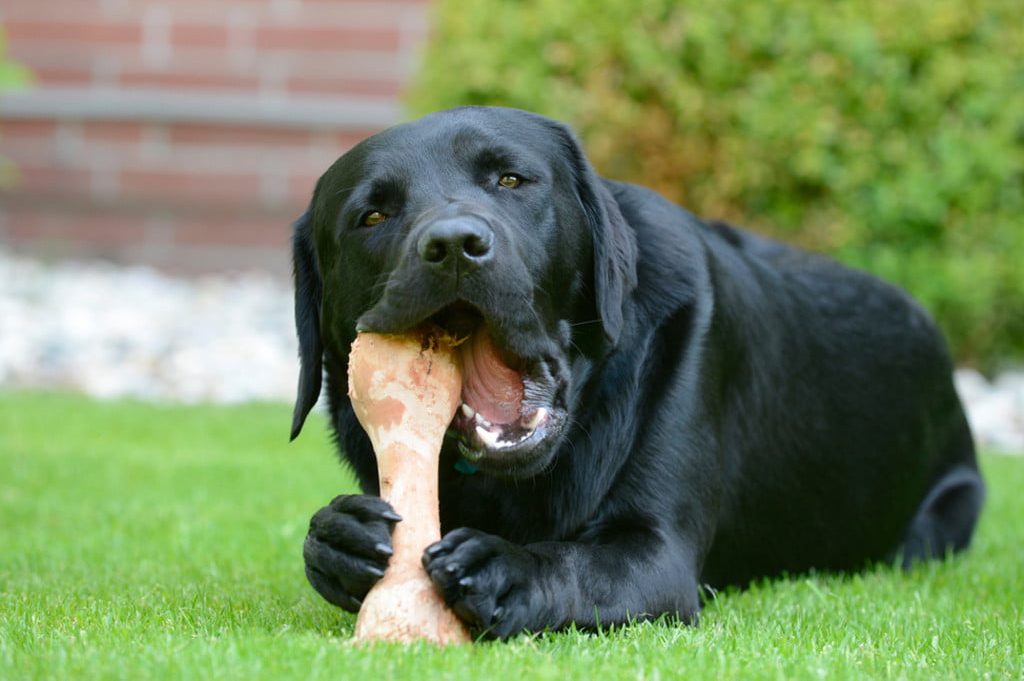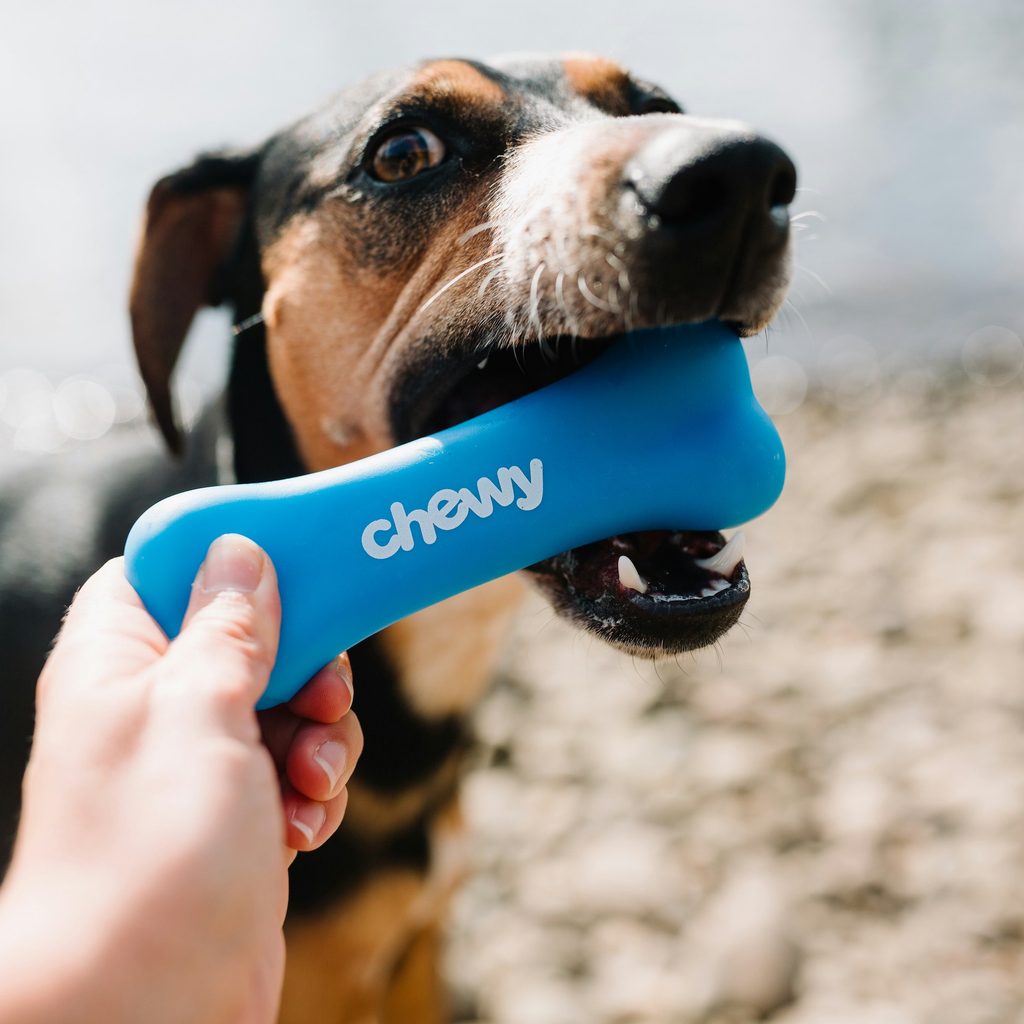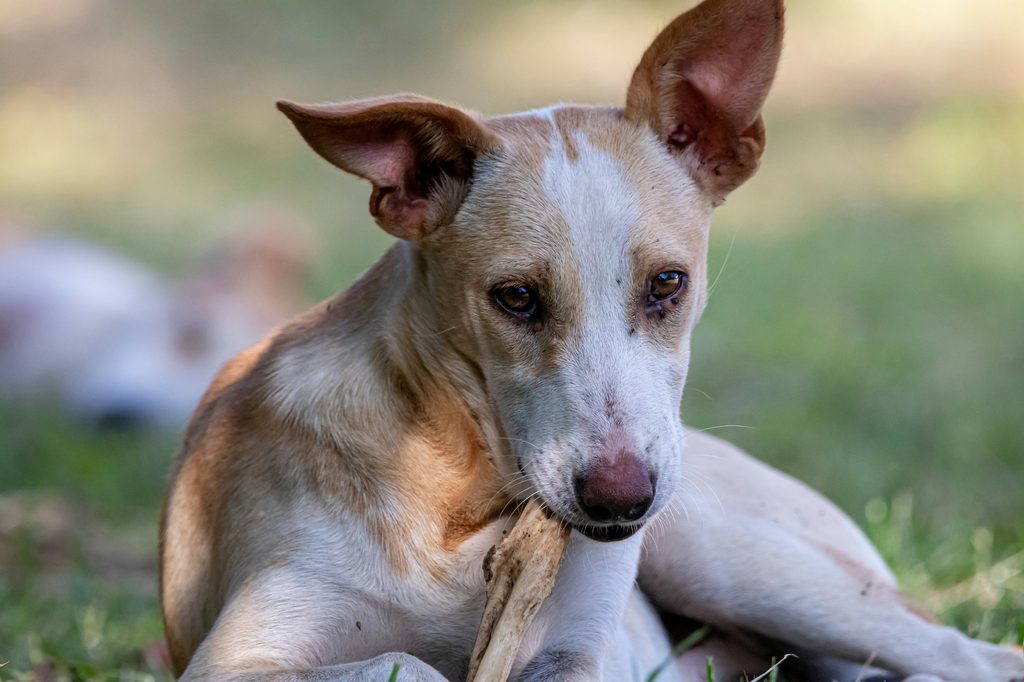
Few symbols represent dogs quite as universally as the bone. Any dog illustration or canine-print fabric is sure to include paw prints and bones, and you’ve likely seen the aisles and aisles of them at your local pet store. Collar identification tags even come in bone shapes! While there’s no doubt that pet parents have accepted their dogs’ love for bones, few have stopped to wonder why exactly dogs and bones go hand in hand.
Why do dogs like bones? Can a dog chew on any bone? There are so many questions to ask. Before you get confused, you can rest assured that we’ve broken down all you need to know about dog bones and why your dog loves them so much. It makes a ton of sense!
Why do dogs like bones?

As it turns out, it all comes down to instinct. Your dog’s love of bones can be traced all the way back to their wild wolf ancestors that relied on their hunting instincts to survive.
Your dog’s ancestors relied on bones for survival
Eons ago, when your pup’s earliest relatives were roaming Earth, they hunted prey for food. Dogs are carnivores, after all, which is why dogs still eat a meat-based diet today. When it came to finding their own dinners, however, not every day was as fruitful. During harsh winters when wolves’ prey was starving and thin, their non-fatty meat provided little sustenance.
According to Dr. Stanley Coren, PhD., DSc, FRSC, wolves would turn to their prey’s bone marrow when fatty meat was running thin. The bones are the last place in the body to store fat in starvation conditions, so the wolves (and other carnivores) who could access their prey’s bone marrow were more likely to survive harsh winters and extreme conditions.
Even though Fido isn’t fighting for survival anymore, dogs still have deeply rooted instincts left over from those ancient hunters. Over time, natural selection favored the wolves that had stronger jaws, and anyone who’s been bitten by a dog can attest to the strength of modern dogs’ jaws. However, this isn’t the only trait that’s carried over. Your dog’s desire to chew on bones was also passed down through evolution because it taps into that part of their brain that says, “You’re doing something satisfying and important.”
In Dr. Coren’s words: “Evolution uses the trick of making necessary behaviors for the survival of the individual or species pleasurable (like eating or sex), and so it has made the bone-chewing eating behavior in dogs such a great satisfaction for them.”
Why do dogs bury bones, though? That’s a whole different question!
Chewing helps dogs learn about their surroundings
Aside from the satisfying feeling that bones themselves give to dogs, the action of chewing can trigger similar feelings of satisfaction. That’s because chewing provides both physical and mental stimulation for dogs, especially puppies still learning about their surroundings.
Humans may only use their mouths to eat, speak, sing, and kiss, but dogs also use their mouths to learn about their environment. Even though this is seen most often in puppies, dogs of all ages taste and feel new things with the help of their mouths. Dogs can even use their mouths to get a better read on pheromones in urine or sweat!
What kinds of bones can dogs have?

It makes sense why dogs like bones so much, but that doesn’t mean you can toss your pup any old bone from your kitchen table. Cooked animal bones, especially thinner bones like chicken, can splinter and break into small, sharp pieces. This is a safety hazard, even if your dog doesn’t eat the bone itself, and can result in a number of painful accidents.
Additionally, bones from your kitchen table may actually be too fatty to share with your dog. Pork bones are especially fatty, though your dog doesn’t have to be eating pork in order to develop pancreatitis. The pancreas can become inflamed with too much fat in the diet, so talk to your veterinarian about their suggested types of bones and chews for dogs.
Some raw meat bones can be fine to share with your pup, but all bones come with risks. Choking, tooth cracking, and intestinal blockages can all occur, so it’s best to supervise your dog when they’re chewing any bone — even bone alternatives like Himalayan dog chews.
Bone alternatives for dogs

Instead of an actual bone or rawhide chew, your vet may recommend giving your dog a similar chew. The professionals at the East Meadow Veterinary Center in New York suggest handing your dog a full-sized carrot when they need to chew. Not only is this a healthy snack, but it’s safe for pups to break off and bite at their own pace, too.
Many vets also recommend Bully Sticks for dogs that like to chew, but these can still scratch your dog’s throat (speaking from first-hand experience). They also have a strong smell, so they’re not a favorite among dog owners. Some more popular alternatives are salmon skin bones, which are self-explanatory, and antlers for super chewers. Just be careful — antlers can break teeth if your pup gets too excited!
There’s a lot to consider before giving your dog a bone, but reading up on the pros and cons can help you make the best decision for your dog. When in doubt, you can always ask your vet’s office for their advice.



